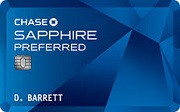Chase Reveals New Freedom Unlimited Card
 In an interview with Reuters, Chase president of Consumer Branded Cards, Pamela Codispoti, recently revealed that Chase would be offering a new cash back credit card in April called the Freedom Unlimited card. Intended to compete against similar offerings from Capital One and Citi, the Freedom Unlimited card will have no annual fee and will earn 1.5x Ultimate Rewards points per dollar spent on all purchases.
In an interview with Reuters, Chase president of Consumer Branded Cards, Pamela Codispoti, recently revealed that Chase would be offering a new cash back credit card in April called the Freedom Unlimited card. Intended to compete against similar offerings from Capital One and Citi, the Freedom Unlimited card will have no annual fee and will earn 1.5x Ultimate Rewards points per dollar spent on all purchases.
The introduction of the Freedom Unlimited card does not mean that the existing Chase Freedom card–which offers 5x points in rotating quarterly bonus categories and 1x points on everything else–is going away. Codispoti said that the Freedom Unlimited card will continue to be available as an alternative, or a companion, to the current Freedom card. According to Codispoti, “Different customers like different offers and some like the current Freedom card.”
Comparing the Freedom Unlimited to the Competition
For the average consumer, who doesn’t pay a lot of attention to the rotating quarterly bonus categories, the current Chase Freedom card–which typically only earns 1x points per dollar spent–is a step behind competing products. For instance, Citi’s Double Cash card earns 2% on all purchases and Capital One’s Quicksilver card, earns 1.5% on all purchases (but also doesn’t charge any foreign transaction fees).
That’s why the introduction of the Freedom Unlimited card makes sense for Chase, as it offers a card more on par with the competition when it comes to typical, non-bonus category spending. Redeeming your Ultimate Rewards points for cash back (at a 1:1 rate) means the Freedom Unlimited card earns 1.5% cash back, compared to the 1% cash back earned by the current Freedom card.
The Chase Sapphire Preferred Card Combo
 Where the Freedom cards become more compelling is when they are coupled with the Chase Sapphire Preferred card. As a bit of background, Ultimate Rewards points can be pooled across all cards you own, as well as those from cards of your significant other, provided they share your same home address. The advantage of having both a Freedom card and the Sapphire Preferred card is that the Sapphire Preferred card allows you to have two additional redemption options for the points you earn with your Freedom card, which can significantly increase the value of your points:
Where the Freedom cards become more compelling is when they are coupled with the Chase Sapphire Preferred card. As a bit of background, Ultimate Rewards points can be pooled across all cards you own, as well as those from cards of your significant other, provided they share your same home address. The advantage of having both a Freedom card and the Sapphire Preferred card is that the Sapphire Preferred card allows you to have two additional redemption options for the points you earn with your Freedom card, which can significantly increase the value of your points:
- You can redeem your points towards travel and get a 20% discount when you use Chase’s Ultimate Rewards portal. For example, when you book through Ultimate Rewards, you can redeem 40,000 points for a flight that costs $500.
- You can transfer your Ultimate Rewards points to partner loyalty programs (such as United, Southwest and Hyatt) where you can often redeem your points at a value of more than 1.25 cents each. This is the option that really unlocks the best potential for your points.
So, assuming you have a Sapphire Preferred card (or the Ink Plus Business card, which confers similar transfer benefits), whether you’re better off with a Freedom card or a 2% cash back card like the Citi Double Cash card or the Fidelity Visa depends upon how you value Ultimate Rewards points. Generally speaking, the break-even point is 1.33 cents per point. If you value partner points at more than 1.33 cents per point, then you’ll do better with the Freedom card vs a 2% cash back card. If you can’t get 1.33 cents of value per point, then you’re better off with a regular 2% cash back card.
Conclusion
More choice is better, and since the existing Freedom card isn’t going away, adding another option is always welcome. The new Freedom Unlimited card will be a boon for some consumers, especially those who don’t usually pay attention to the rotating quarterly bonus categories. It should also be good for those who are dedicated to the Ultimate Rewards points ecosystem, as it will introduce yet another way to earn more Ultimate Rewards points.


 Follow Credit Card Watcher on Facebook
Follow Credit Card Watcher on Facebook Follow Credit Card Watcher on Twitter
Follow Credit Card Watcher on Twitter Bookmark this site
Bookmark this site